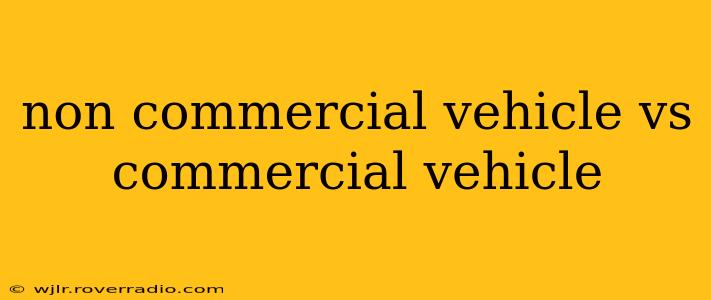The distinction between non-commercial and commercial vehicles is crucial for various reasons, including insurance, licensing, taxation, and regulations. Understanding the differences is vital for both individuals and businesses. This guide will clarify the key distinctions and answer frequently asked questions.
What is a Non-Commercial Vehicle?
A non-commercial vehicle is primarily used for personal transportation or non-business purposes. This includes cars, SUVs, motorcycles, and other vehicles used for commuting, family outings, and personal errands. The vehicle's primary purpose is not to generate revenue or be used in a business context.
What is a Commercial Vehicle?
A commercial vehicle is any vehicle used for business purposes, primarily to generate income or transport goods or services. This broad category encompasses a wide range of vehicles, including:
- Light Commercial Vehicles (LCVs): Vans, pickup trucks, and small delivery trucks used for transporting goods or equipment.
- Heavy Commercial Vehicles (HCVs): Large trucks, buses, and other vehicles designed for heavier loads and larger passenger capacities. These often require special licenses and undergo stricter safety regulations.
- Specialized Commercial Vehicles: Vehicles designed for specific business purposes, such as tow trucks, ambulances, and garbage trucks.
Key Differences: Non-Commercial vs. Commercial Vehicles
| Feature | Non-Commercial Vehicle | Commercial Vehicle |
|---|---|---|
| Primary Use | Personal transportation, non-business purposes | Business purposes, generating revenue |
| Licensing | Standard driver's license | Often requires specialized licenses (e.g., CDL) |
| Insurance | Typically less expensive insurance | Typically more expensive insurance, often specialized |
| Taxes | Lower taxes (depending on location and vehicle type) | Higher taxes and potential additional fees |
| Regulations | Fewer stringent regulations | More stringent regulations regarding safety and maintenance |
| Modifications | Fewer restrictions on modifications | Stricter regulations on modifications for safety and legality |
How is Vehicle Use Determined?
Determining whether a vehicle is commercial or non-commercial depends largely on its primary use. Even if a personal vehicle is occasionally used for business purposes (e.g., transporting supplies for a small home-based business), it’s generally still classified as non-commercial as long as this isn't the primary function. Conversely, a vehicle primarily used for business, even if occasionally used for personal trips, is classified as commercial.
What are the Implications of Misclassifying a Vehicle?
Misclassifying a vehicle can lead to serious consequences, including:
- Invalid insurance: A commercial vehicle not properly insured may result in severe financial penalties in case of an accident.
- Legal penalties: Operating a commercial vehicle without the necessary licenses can lead to fines and legal action.
- Tax liabilities: Incorrect tax filings based on vehicle classification could result in hefty penalties.
What about Vehicles Used for Both Personal and Business Purposes?
The line can blur when vehicles serve both personal and business purposes. In such cases, insurance companies and regulatory bodies often consider the primary use of the vehicle. Detailed record-keeping of vehicle usage can be helpful in these situations to demonstrate the primary function. It’s always best to consult with insurance providers and relevant authorities to ensure proper classification.
How do I know which category my vehicle falls under?
Consult your insurance provider and refer to your local Department of Motor Vehicles (DMV) or equivalent agency for definitive guidance. They can provide the most accurate classification based on your specific circumstances and location.
This information is for general guidance only and does not constitute legal or financial advice. Always consult with relevant professionals for specific situations.
